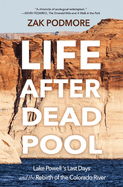
With Life After Dead Pool: Lake Powell's Last Days and the Rebirth of the Colorado River, investigative journalist Zak Podmore tackles a massive, complicated set of questions about western water management and the Glen Canyon Dam, the construction of which created a reservoir called Lake Powell. Arguably the most politically fraught and symbolic dam in the southwestern United States, Glen Canyon has long had its fans and detractors. The Millennium Drought, "an indefinite change in precipitation patterns" in the region, has "done three-quarters of the work toward draining Lake Powell already," but this leaves numerous challenges: Indigenous people's water rights, engineering and hydrology puzzles, the ecological implications for long-flooded lands freshly exposed to open air or buried under millions of acre-feet of sedimentation, and more.
Podmore acknowledges his own biases about the dam, which was in place before he was born. But he proceeds with copious and in-depth research into the many and complex issues it poses, considers what he learns with an open mind, and integrates hard science, cultural awareness, and competing viewpoints into an admirably accessible work of creative nonfiction. Podmore avoids binary options and magical thinking, and his study is richer for it. Included are surprisingly hopeful notes, such as the rapid recovery of native plants and ecosystems in newly exposed side canyons: "A canyon one hundred miles away, drowned for half a century, had restored itself in fewer than twenty years." With narrative style and colorful characters, Podmore (Confluence) has composed a compelling, readable, and entertaining as well as educational text. Life After Dead Pool is superlative: important, insightful, and a pleasure to read. --Julia Kastner, librarian, teacher and blogger at pagesofjulia

